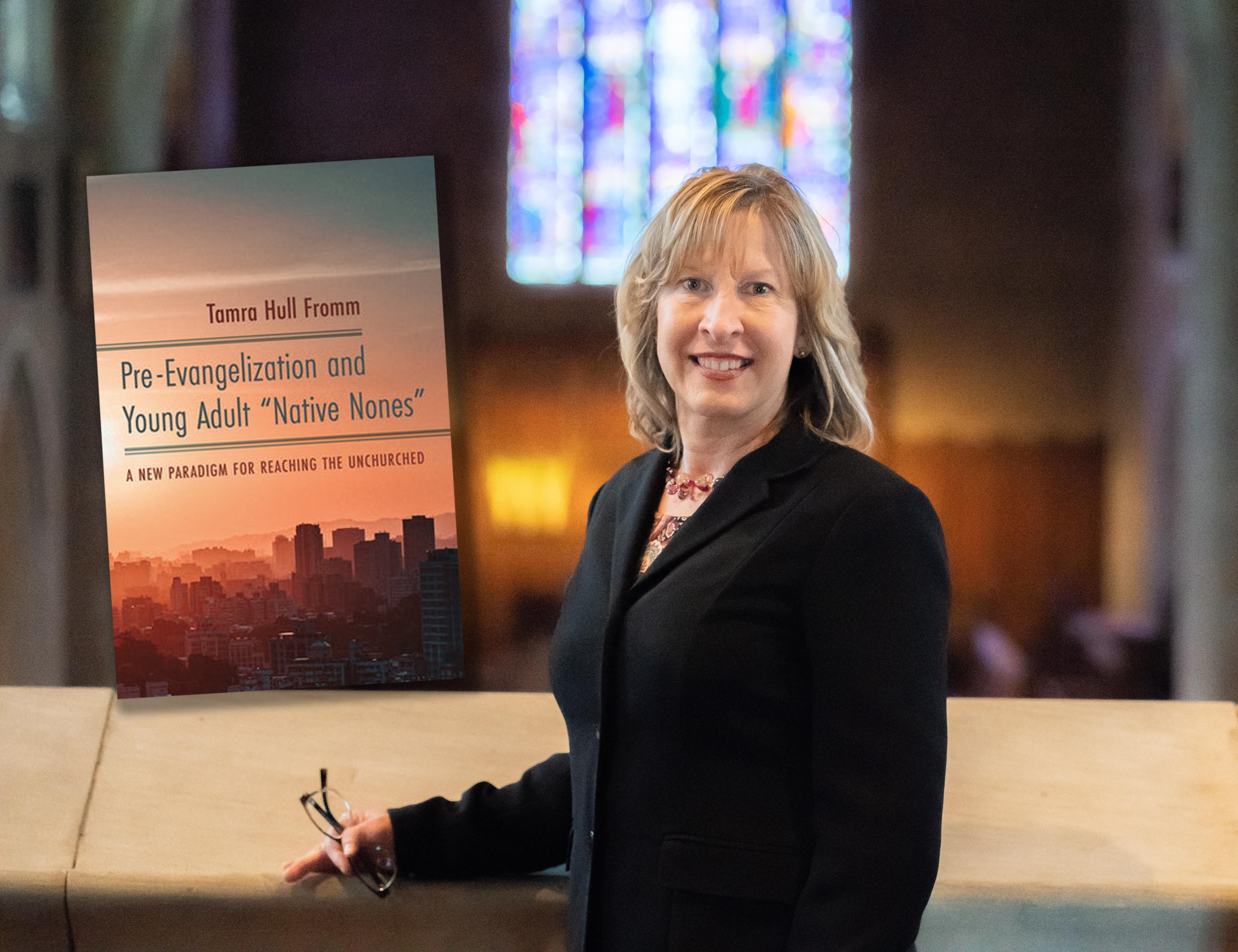In a culture that actively marginalizes faith, the best way to encourage others to seek Christ is by ‘sharing our story,’ Tamra Hull Fromm argues
DETROIT — Young adult “nones” — those who practice no religion at all — can become attracted to the Catholic faith through the authentic witness of committed, practicing Catholics, a Detroit-area researcher says in a new book.
Though that might seem self-evident, such research can have a big impact on the way the Church evangelizes in the 21st century, said Tamra Hull Fromm, Ph.D., an instructor for the Catholic Biblical School of Michigan and a former lecturer at Sacred Heart Major Seminary.
Fromm’s book, “Pre-Evangelization and Young Adult ‘Native Nones’: A New Paradigm for Reaching the Unchurched” (Wipf and Stock), is a compilation of her doctoral research, in which she surveyed 24 Detroit-area young adults who chose to convert to the Catholic faith after having been raised with no religion.
“What is it that motivates a person to come to faith? It really intrigued me to think about this,” Fromm told Detroit Catholic. “Especially in light of the growing number of ‘nones,’ what stimulates them to check out the Catholic Church?”
In some ways, the Church’s future depends on the answer, Fromm says.
According to the Pew Research Center and others, “nones” comprise a rapidly growing segment of the population — by some estimates as many as 26% of Americans — while affiliation with traditional religions such as Catholicism and mainline Protestant denominations continues to shrink at an alarming rate.
Gone are the days when the Church could count on its institutional foothold to expose the next generation to its teachings and traditions. Instead of reinforcing the Church’s role in public life, today’s culture actively seeks to marginalize faith — which presents a huge challenge for evangelizing the unchurched, Fromm said.
“Because we're not living in a Christianized culture, the only way some people see Christianity is through our witness,” Fromm said. “Those who have grown up without a faith often have a very fragile, narrow and sometimes stereotypical perception of a Christian.”
When that stereotype is reinforced — often by self-professed Christians acting hypocritically — it only deepens the stereotype and drives people further from the faith, Fromm said.
“One of the young women I interviewed mentioned that she had encountered a particular person, whom she identified as Christian, who was making fun of homeless people,” Fromm said. “She had been homeless in the past. Because of that, she just assumed all Christians were — excuse me for this — (jerks). And so she said, ‘Why would I want to become like that?’”
In Fromm’s research, the majority of the young “nones” who ultimately decided to enter RCIA had a strong Catholic role model in their lives — often a friend, co-worker or romantic partner.
“In many cases, they are encountering this person in the context of an engagement, a marriage, a workplace, or perhaps even a friend, but someone who causes them to think differently about the faith, someone who is an authentic witness of Jesus, even without saying the word Jesus or proclaiming the Gospel explicitly,” Fromm said. “That person incites a curiosity.”
While the Church is swimming against a post-modern tide that claims there is no objective truth, human beings still long for meaning and have an innate sense that there is more to life, Fromm said.
“The counter argument to (secular society) is the powerful witness of a story,” Fromm said. “My testimony becomes more powerful than the so-called ‘meta-narrative’ or overarching story. And I think that has implications for how we, as Catholic Christians, reach out to those ‘nones.’ We have to be able to know our story, to share our story. People are moved by stories.”
Catholics ought not be afraid to engage in conversations about apologetics or field questions about the faith, Fromm said.
“The role of the laity is to be the face of Christ out there in the wilderness, so to speak, and to be willing to answer questions,” Fromm said. “They don’t have to be theological experts. There’s so much misperception about what the Church teaches, and often people just want to be able to ask questions in a safe space and not be shut down.”
As young “nones” increasingly turn to the internet for answers, Fromm said it’s important for lay Catholics to know how to direct seekers to authentic Catholic resources, not necessarily to know all the answers.
While the laity are the new front-line witnesses to the faith, parishes still have an important role in forming lay Catholics to be evangelizers, Fromm said.
“One of the things parishes can do is to form the laity in their powerful role of being witnesses,” Fromm said. “They’re the ones who are out there on the front lines. The ‘nones’ are not showing up to our parishes.”
“We're going to be facing a larger number of ‘nones’ in the future, and it’s going to really impact how we do evangelization,” Fromm added. “We’re going to have to become curators. We’re going to have to become translators, using a different language, new methods, and individualizing the way we approach people rather than a one-size-fits-all.”
Order the book
Tamra Hull Fromm’s book, “Pre-Evangelization and Young Adult ‘Native Nones’: A New Paradigm for Reaching the Unchurched,” can be ordered through Wipf and Stock for $23 (softcover or ebook), or $38 for a hardback.










